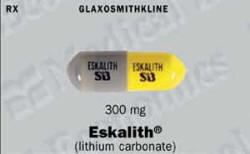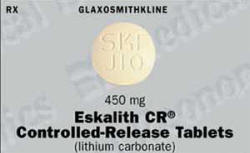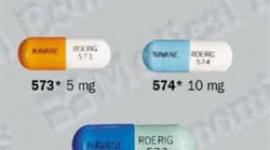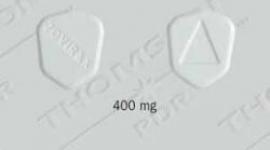Eskalith (Lithium Carbonate) Patient Information
Find out why Lithium (Eskalith) is prescribed, side effects of Lithium, Lithium warnings, effects of Lithium during pregnancy, more - in plain English.
Generic name: Lithium carbonate
Other brand names: Carbolith, Cibalith-S, Duralith, Eskalith CR, Lithane, Lithizine, Lithobid, Lithonate, Lithotabs
Eskalith (lithium carbonate) Full Prescribing Information
Why is Lithium prescribed?
Eskalith is used to treat the manic episodes of manic-depressive illness, a condition in which a person's mood swings from depression to excessive excitement. A manic episode may involve some or all of the following symptoms:
Aggressiveness
Elation
Fast, urgent talking
Frenetic physical activity
Grandiose, unrealistic ideas
Hostility
Little need for sleep
Poor judgment
Once the mania subsides, Eskalith treatment may be continued over the long term, at a somewhat lower dosage, to prevent or reduce the intensity of future manic episodes.
Some doctors also prescribe lithium for premenstrual tension, eating disorders such as bulimia, certain movement disorders, and sexual addictions.
Most important fact about Lithium
If the Eskalith dosage is too low, you will derive no benefit; if it is too high, you could suffer lithium poisoning. You and your doctor will need to work together to find the correct dosage. Initially, this means frequent blood tests to find out how much of the drug is actually circulating in your bloodstream. As long as you take Eskalith, you will need to watch for side effects. Signs of lithium poisoning include vomiting, unsteady walking, diarrhea, drowsiness, tremor, and weakness. Stop taking the drug and call your doctor if you have any of these symptoms.
How should you take Lithium?
To avoid stomach upset, take Eskalith immediately after meals or with food or milk.
Do not change from one brand of lithium to another without consulting your doctor or pharmacist. Take the drug exactly as prescribed.
While taking Eskalith, you should drink 10 to 12 glasses of water or fluid a day. To minimize the risk of harmful side effects, eat a balanced diet that includes some salt and lots of liquids. If you have been sweating a great deal or have had diarrhea, make sure you get extra liquids and salt.
If you develop an infection with a fever, you may need to cut back on your Eskalith dosage or even quit taking it temporarily. While you are ill, keep in close touch with your doctor.
Long-acting forms of lithium, such as Eskalith CR or Lithobid, should be swallowed whole. Do not chew, crush, or break.
--If you miss a dose...
Ask your doctor what to do; requirements vary for each individual. Do not take 2 doses at once.
--Storage instructions...
Store at room temperature.
What side effects may occur when taking Lithium?
The possibility of side effects varies with the level of lithium in your bloodstream. If you experience unfamiliar symptoms of any kind, inform your doctor as soon as possible.
-
Side effects that may occur when you start taking lithium include: Discomfort, frequent urination, hand tremor, mild thirst, nausea
-
Other side effects of Lithium may include: Abdominal pain, blackout spells, cavities, changes in taste perception, coma, confusion, dehydration, dizziness, dry hair, dry mouth, fatigue, gas, hair loss, hallucinations, increased salivation, indigestion, involuntary tongue movements, involuntary urination or bowel movements, irregular heartbeat, itching, loss of appetite, low blood pressure, muscle rigidity, muscle twitching, painful joints, poor memory, restlessness, ringing in ears, seizures, sexual dysfunction, skin problems, sleepiness, slowed thinking, slurred speech, startle response, swelling, thinning hair, tightness in chest, vision problems, vomiting weakness, weight gain, weight loss
Why should Lithium not be prescribed?
Although your doctor will be cautious under certain conditions, lithium may be prescribed for anyone.
Special warnings about Lithium
Eskalith may affect your judgment or coordination. Do not drive, climb, or perform hazardous tasks until you find out how this drug affects you.
Your doctor will prescribe Eskalith with extra caution if you have a heart or kidney problem, brain or spinal cord disease, or a weak, run-down, or dehydrated condition.
Also make sure your doctor is aware of any medical problems you may have, including diabetes, epilepsy, thyroid problems, Parkinson's disease, and difficulty urinating.
You should be careful in hot weather to avoid activities that cause you to sweat heavily. Also avoid drinking large amounts of coffee, tea, or cola, which can cause dehydration through increased urination. Do not make a major change in your eating habits or go on a weight loss diet without consulting your doctor. The loss of water and salt from your body could lead to lithium poisoning.
Possible food and drug interactions when taking Lithium
If Eskalith is taken with certain other drugs, the effects of either could be increased, decreased, or altered. It is especially important to check with your doctor before combining Eskalith with the following:
ACE-inhibitor blood pressure drugs such as Capoten or Vasotec
Acetazolamide (Diamox)
Amphetamines such as Dexedrine
Antidepressant drugs that boost serotonin levels, including Paxil, Prozac, and Zoloft
Bicarbonate of soda
Caffeine (No-Doz)
Calcium-blocking blood pressure drugs such as Calan and Cardizem
Carbamazepine (Tegretol)
Diuretics such as Lasix or HydroDIURIL
Fluoxetine (Prozac)
Iodine-containing preparations such as potassium iodide (Quadrinal)
Major tranquilizers such as Haldol and Thorazine
Methyldopa (Aldomet)
Metronidazole (Flagyl)
Nonsteroidal anti-inflammatory drugs such as Advil, Celebrex, Feldene, Indocin, and Vioxx
Phenytoin (Dilantin)
Sodium bicarbonate Tetracyclines such as Achromycin V and Sumycin
Theophylline (Theo-Dur, Quibron, others)
Special information if you are pregnant or breastfeeding
The use of Lithium during pregnancy can harm the developing baby. If you are pregnant or plan to become pregnant, inform your doctor immediately.
Eskalith appears in breast milk and is considered potentially harmful to a nursing infant. If this medication is essential to your health, your doctor may advise you to discontinue breastfeeding while you are taking it.
Recommended dosage for Lithium
ADULTS
Acute Episodes
The usual dosage is a total of 1,800 milligrams per day. Immediate-release forms are taken in 3 or 4 doses per day; long-acting forms are taken twice a day.
 Your doctor will individualize your dosage according to the levels of the drug in your blood. Your blood levels will be checked at least twice a week when the drug is first prescribed and on a regular basis thereafter.
Your doctor will individualize your dosage according to the levels of the drug in your blood. Your blood levels will be checked at least twice a week when the drug is first prescribed and on a regular basis thereafter.
Long-term Control
Dosage will vary from one individual to another, but a total of 900 milligrams to 1,200 milligrams per day is typical. Immediate-release forms are taken in 3 or 4 doses per day; long-acting forms are taken twice a day.
 Blood levels in most cases should be checked every 2 months.
Blood levels in most cases should be checked every 2 months.
CHILDREN
Safety and effectiveness of Eskalith in children under 12 years of age have not been established.
OLDER ADULTS
Older people often need less Eskalith and may show signs of overdose at a dosage younger people can handle well.
Overdosage of Lithium
Any medication taken in excess can have serious consequences. If you suspect symptoms of an overdose of Eskalith, seek medical attention immediately.
The harmful levels are close to those that will treat your condition. Watch for early signs of overdose, such as diarrhea, drowsiness, lack of coordination, vomiting, and weakness. If you develop any of these signs, stop taking the drug and call your doctor.
APA Reference
Staff, H.
(2009, January 3). Eskalith (Lithium Carbonate) Patient Information, HealthyPlace. Retrieved
on 2024, April 27 from https://www.healthyplace.com/other-info/psychiatric-medications/eskalith-lithium-carbonate-patient-information

